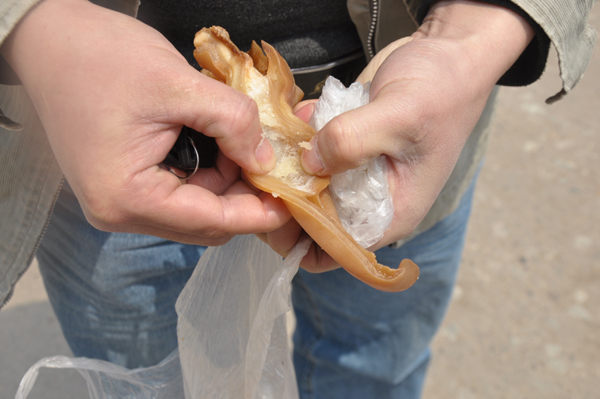Fake stewed pig ears pose health risks
By Zheng Xin (China Daily) Updated: 2012-05-16 07:36Some stewed pig ears have been made from chemicals that could cause blood and heart problems in East China, sounding a fresh alarm on food safety.
The popular Chinese snacks sold at a market in Ganzhou, the second-largest city in Jiangxi province, were made from gelatin and sodium oleate, the food safety office under the Jiangxi provincial health department said on Tuesday.
The case is being investigated by the local public security bureau.
A man from Ganxian county of Ganzhou bought some cooked pig ears on March 30, only to find they smelled terrible when he was going to eat them.
 |
|
A man tries to tear apart artificial pig ears that were found recently in Ganzhou, East China's Jiangxi province. Xinhua News Agency |
He sent the ears to the industrial and commercial bureau of Ganxian, and local authorities detained the alleged seller on April 1.
Samples were sent to testing organizations earlier this month.
The identity of the seller was not revealed, and it is unknown who made the ears.
Chinese food safety regulations ban sodium oleate from food, said Fan Zhihong, associate professor of nutrition and food safety at the China Agricultural University.
"Adding the chemical makes the ears taste better and makes it hard for customers to discover that the ears are actually fake," Fan said. "Eating an excessive amount of sodium can result in high blood pressure and influence the heart's function."
The gelatin used in the artificial pig ears may pose an even bigger health hazard, Fan said.
Given the cheap price of pig ears, the gelatin used to make them is very likely to be of very poor quality or may be industrial gelatin, Fan said.
Industrial gelatin, a forbidden additive in China and made from leather products, is very high in chromium, which might result in cancer.
According to Yang Fan, a researcher at the Green Beagle, an environmental protection non-governmental organization based in Beijing, there are ways to distinguish fake ears from real ones.
Hair and capillaries usually can be seen on real pig ears, while fake ones do not have hair or capillaries, Yang said.
Contact the writers at zhengxin@chinadaily.com.cn
- Li to explain China to business titans at economic forum
- More HK women find a passion for mainlanders
- PLA officers placed under investigation
- Former Nanjing mayor stands trial
- Nuclear power safer than ever
- Domestic vaccine for polio licensed
- Vets battle to save stricken panda in Shaanxi
- Heavy fog disrupts air traffic in Xinjiang
- Article alleges Zhou linked with Bo
- Officials set up pilgrimages for unqualified people






